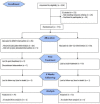A single-session Mindfulness-Based Swinging Technique vs. cognitive disputation intervention among women with breast cancer: A pilot randomised controlled study examining the efficacy at 8-week follow-up
- PMID: 36337479
- PMCID: PMC9632732
- DOI: 10.3389/fpsyg.2022.1007065
A single-session Mindfulness-Based Swinging Technique vs. cognitive disputation intervention among women with breast cancer: A pilot randomised controlled study examining the efficacy at 8-week follow-up
Abstract
Objective: Previously Mindfulness-Based Swinging Technique (MBST)'s immediate efficacy for overcoming psychological concerns has recently received empirical support, yet its longer-term efficacy needed to be evaluated among women with breast cancer. The objective of this study was to assess and report the efficacy of MBST intervention among breast cancer patients for hopelessness, anxiety, depression, self-efficacy, oxygen (SpO2) intensity, and heart rate-beats per minute (HR-bpm) at an 8-week period.
Method: The State-Trait Anxiety Inventory, The Emotion Thermometer, Hospital Anxiety and Depression Scale, Self-Efficacy for Managing Chronic Disease, and Beck's Hopelessness Scale were used for assessing the intervention's outcome; 149 BC patients were randomly assigned into two groups (equal-mean-age, p = 0.262). The participants in the control group (CG, n = 73) received Cognitive Behavioural Therapy (CBT)-Cognitive-Disputation (CBT-CD) for 20 min, and intervention group (IG, n = 76) received MBST intervention. No additional psychological interventions were given between week-1 and week-8.
Result: Outcomes of the 8-week post-treatment follow-up exhibited significantly higher improvements in all evaluated-measurements for CG, and some for IG with large effect size in the following: anxiety (CG p < 0.05, r = 0.57; IG p < 0.05, r = 0.44) and depression levels (CG p < 0.05, r = 0.43). It increased self-efficacy for managing disease (CG p < 0.05, r = 0.49; IG p < 0.05, r = 0.41) and hopefulness (CG p < 0.05, r = 0.59; IG p < 0.05, r = 0.46), and saturation levels measured by pulse-meter/oximeter (CG p < 0.05, r = 0.49; IG p < 0.05, r = 0.32).
Conclusions: Both CBT-CD and MBST have been found to be efficacious interventions to shorten the psychotherapy duration for reducing clinical anxiety and hopelessness as well as increase self-efficacy for BC women. This may have a distinct clinical importance for supporting BC patient's adherence-to-treatment since CBT-CD could be an alternative technique to MBST as a brief intervention. In future studies, the effectiveness of MBST through adapting to virtual reality and other online delivery methods should be examined.
Keywords: MBST®; Mindfulness-Based Swinging Technique; adherence-to-treatment; anxiety; breast cancer; cognitive disputation; mindfulness; self-efficacy.
Copyright © 2022 Bahcivan, Gutierrez-Maldonado and Estapé.
Conflict of interest statement
Author TE was employed by FEFOC Foundation. The remaining authors declare that the research was conducted in the absence of any commercial or financial relationships that could be construed as a potential conflict of interest.
Figures
References
-
- Akkoyunlu S., Turkcapar M. H. (2013). Bir teknik: Alternatif düşünce oluşturulmasi [One technique: Generating alternative thinking]. Bilişsel Davranişçi Psikoterapi ve Araştirmalar Dergisi 2, 53–59.
-
- Aydemir O., Guvenir T., Kuey L., Kultur S. (1997). Validity and reliability of Turkish version of hospital anxiety and depression scale. Turk Psikiyatri Derg. 8, 280–287.
LinkOut - more resources
Full Text Sources


